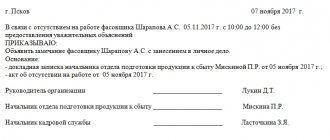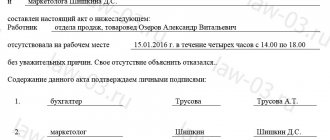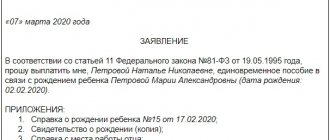Home / Labor Law / Responsibility / Disciplinary
Back
Published: 06/02/2016
Reading time: 9 min
0
7922
Absenteeism is a gross violation of labor discipline, for which the employer has the right to take disciplinary action against the employee .
Moreover, depending on the decision of management, this can be either a reprimand or a reprimand, or a more severe measure - dismissal. It is worth considering in more detail the features and conditions of application of each type of punishment, as well as situations in which it is better to choose one or another measure.
- General conditions for applying punishment The employee actually committed absenteeism
- An employer can prove that an employee committed a violation
How to correctly draw up an order for violation of labor discipline
In an order to impose a penalty such as a reprimand on an employee, it is advisable to indicate:
- date and place of drawing up the order;
- name of the employing company;
- number, name of the document (“Order No. ... on reprimand”);
- a text block reflecting the essence of the employee’s violation of labor duties;
- a resolute text block in the first person (“I order...”);
- list of attached documents - if any.
Find out what nuances need to be taken into account when drawing up a reprimand order so that the employee cannot challenge the punishment in court. If you do not have access to the K+ system, get a trial online access for free.
Reprimand as a punishment for absenteeism
In essence, a reprimand is not much different from a reprimand, but this measure is still more serious. For example, some enterprises introduce a system of punishment for employees in which the presence of several reprimands is grounds for subsequent dismissal.
A reprimand is a negative assessment of an employee’s actions by the employer, expressed by the latter in official form. Like a reprimand, a reprimand is not noted in the work record book, but can be displayed on the employee’s personal card.
The procedure for issuing a reprimand is similar to applying a reprimand and includes the following actions:
- Preparation of documents confirming the employee’s guilt (absenteeism report and memo).
- Receiving a written explanation from the employee (in case of refusal to provide an explanation, a report is also drawn up).
- The employer's decision regarding the employee's guilt. For example, if the reason for absenteeism was valid (a summons to court, an accident, illness) and the employee is able to confirm this, punishment may not be applied.
- Issuing an order to reprimand the employee. Within three working days he must be familiarized with it against his signature.
The terms for imposing a reprimand are the same as for a reprimand - six months and a month from the date of commission and discovery of the offense, respectively.
After the end of the year, the reprimand is also removed from the employee, unless during this time he has committed new disciplinary offenses.
Who should sign the reprimand order?
First of all, it must be signed by the director of the organization. In accordance with the provisions of Art. 193 of the Labor Code of the Russian Federation, the order must also be endorsed by the employee of the company on whom the disciplinary sanction is imposed, no later than 3 days from the date of publication of the document. If an employee does not want to confirm familiarization with the order with a signature, a report to this effect is drawn up.
EXPLANATIONS from ConsultantPlus: How to calculate the period during which the employer must familiarize the employee with the order to apply a disciplinary sanction in the form of a reprimand if he has a shift work schedule? Are three working days counted according to the organization’s work schedule or according to the employee’s work schedule? Does the time of issuance of the order matter? Read the answers to these and other questions in K+ by getting trial demo access for free.
Reprimand as a form of punishment
The mildest punishment is a reprimand to the employee, which is applied in the case of minor and insignificant offenses.
Disciplinary action in the form of a remark can be expressed both orally and in writing, with the first type being the most common.
As a punishment for absenteeism, this measure can be applied if the employer considers the reason for absence from work to be relatively significant and does not want to punish the subordinate more severely.
After recording the fact of an offense and receiving a written explanation from the employee, the employer may issue an order to reprimand the employee. It must contain a link to the articles of the relevant regulatory documents (both local and federal) on the basis of which the punishment is applied. The guilty employee must read the order and confirm this with his signature.
A reprimand can be applied within six months after truancy and within a month from the date of its discovery.
As for the duration of the punishment, it is one year - after that the reprimand is removed. However, at the initiative of the employer or based on a written request from the employee, the penalty may be lifted earlier.
Results
An order to impose any type of disciplinary sanction on an employee, including a reprimand, will have legal force only if it is drawn up within the framework of the algorithm provided for by the Labor Code of the Russian Federation, including:
- preliminary request for an explanatory note (and drawing up a report on its failure to provide it, if necessary);
- publication and signing of the order by the manager;
- obtaining an employee’s signature confirming the fact of familiarization with the order (or drawing up a report on the employee’s refusal to sign the document).
You can familiarize yourself with other nuances of issuing a reprimand and other disciplinary sanctions provided for by the Labor Code of the Russian Federation in the articles:
- “Reprimand as a disciplinary sanction (nuances)”;
- "Disciplinary sanction order - sample and form."
You can find more complete information on the topic in ConsultantPlus. Free trial access to the system for 2 days.
Rules for completing an order
The order is issued in a single copy
- on a regular A4 sheet
- or on the company’s letterhead (the latter option is preferable - there is no need to additionally enter the organization’s details).
You can write it either by hand or print it on a computer. But regardless of which option is chosen, the order must be certified with a “live” autograph of the head of the organization. There is no need to put a seal on it, since it relates to the internal documentation of the enterprise and, moreover, since 2016, legal entities may not use seals and stamps at all to endorse papers.
What is considered truancy?
Absenteeism is the absence of an employee from the workplace for more than four hours in a row without good reason.
In practice, there are several situations that can be considered absenteeism:
- the employee did not show up for work and was absent during the entire working day;
- the employee was absent from the workplace for more than four hours in a row without explanation;
- the citizen submitted a resignation letter at will, but did not go to work to work a two-week period before the date of dismissal;
- an employee with whom a fixed-term employment contract was concluded did not return to work before the end of the contract;
- the citizen used days off or went on vacation without permission without approval from the employer.
You should know! If the employer delays wages for more than 15 days in a row, the employee has the right not to come to work. Such actions cannot be regarded as absenteeism if the citizen notified the employer in writing of the suspension of work until the delayed amount is paid.
Concept and legal regulation
According to the law, the employer has the right to take disciplinary action against an employee if he does not fulfill or improperly fulfills his duties under an employment contract, job description or local regulatory act (for example, internal regulations). In this case, an important condition for the onset of disciplinary liability is the preliminary familiarization of the employee with the specified rules against signature. In other words, if the employee was not familiar with the contents of the document with a list of his job responsibilities, then he may be released from liability for failure to fulfill them.
According to Art. 192 of the Labor Code, there are three basic forms of disciplinary action: reprimand, dismissal and reprimand. Special laws may establish other forms of disciplinary liability. The employer should adhere to the legally established forms of punishment, so if he uses one of the non-existent forms, then in the future, dismissal for repeated misconduct may be considered illegal.
Such a form of punishment, often practiced by the employer, as the imposition of a fine, cannot be considered as a legal way of punishing an employee. If an employer applies it to its employees, it may be subject to administrative liability in the form of a fine. Failure to comply with the current procedure for imposing penalties threatens the employer with liability under the Code of Administrative Offenses in the amount of 1-5 thousand rubles. for management and 30-50 thousand rubles. to a legal entity.
One disciplinary offense can become the basis for the application of only one form of punishment . For example, for being late you cannot reprimand and reprimand at the same time. At the same time, a reprimand is a fairly serious form of disciplinary action, because according to Art. 81 of the Labor Code, if the employee is reprimanded again within a year, it is already possible to dismiss him.
A reprimand can only be given to current employees whose employment contract has not been terminated. After the dismissal of an employee, the use of disciplinary sanctions has no practical meaning. The employer is not subject to disciplinary liability.
A reprimand is one of the ways to increase labor discipline and plays important regulatory and educational functions among workers.
Consequences for the employee
If an employee is reprimanded at work, the consequences may be as follows:
- this may serve as a basis for deprivation of the bonus (if this is indicated in the Regulations on bonuses);
- in cases where the violations are systematic and the offender makes no attempt to correct the situation, two such suggestions may be enough to dismiss the employee - for example, in the case of regular absenteeism, or alcohol abuse.
The suggestion is valid for a year, after which the employee is considered not to have a disciplinary sanction, although the employer, if desired, can remove the sanction earlier by formalizing this action with a separate order.
Can an employee be given a “severe reprimand”?
It is worth noting that the Labor Code of the Russian Federation does not provide for such a thing as a severe reprimand. However, according to Art. 189 of the Labor Code of the Russian Federation, for certain categories of employees other types of disciplinary sanctions may be provided for, established by separate legal acts. An example of legislative acts that provide for the use of a severe reprimand are:
- Art. 41.7 Federal Law “On the Prosecutor’s Office of the Russian Federation”;
- Art. 29 Federal Law “On service in the customs authorities of the Russian Federation”;
- Chapter 4, paragraph 54 of the Disciplinary Charter of the Armed Forces of the Russian Federation, etc.
Persons regulated by these laws may be legally subject to severe reprimand. In any case, the employee cannot be reprimanded and recorded in his personal file, since information about the reprimand is not entered in his personal file. But you can add it to your personal card to track whether the employee has disciplinary sanctions.





